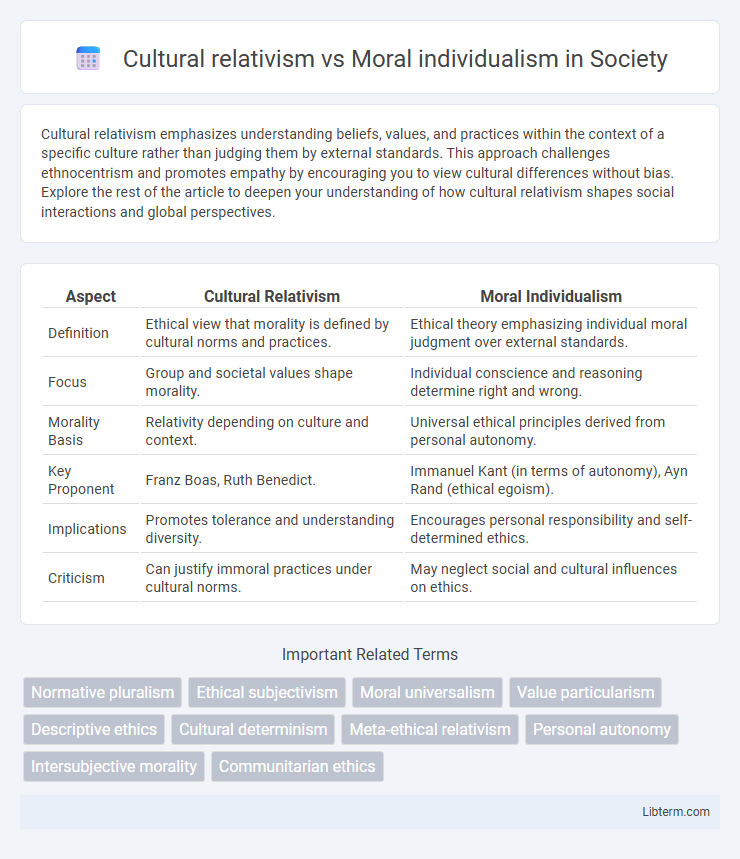Cultural relativism emphasizes understanding beliefs, values, and practices within the context of a specific culture rather than judging them by external standards. This approach challenges ethnocentrism and promotes empathy by encouraging you to view cultural differences without bias. Explore the rest of the article to deepen your understanding of how cultural relativism shapes social interactions and global perspectives.
Table of Comparison
| Aspect | Cultural Relativism | Moral Individualism |
|---|---|---|
| Definition | Ethical view that morality is defined by cultural norms and practices. | Ethical theory emphasizing individual moral judgment over external standards. |
| Focus | Group and societal values shape morality. | Individual conscience and reasoning determine right and wrong. |
| Morality Basis | Relativity depending on culture and context. | Universal ethical principles derived from personal autonomy. |
| Key Proponent | Franz Boas, Ruth Benedict. | Immanuel Kant (in terms of autonomy), Ayn Rand (ethical egoism). |
| Implications | Promotes tolerance and understanding diversity. | Encourages personal responsibility and self-determined ethics. |
| Criticism | Can justify immoral practices under cultural norms. | May neglect social and cultural influences on ethics. |
Introduction to Cultural Relativism and Moral Individualism
Cultural relativism asserts that moral values and practices are understood within the context of specific cultures, emphasizing that no single ethical framework is universally superior. Moral individualism, on the other hand, prioritizes personal autonomy and the individual's capacity to determine right and wrong independently of cultural or societal norms. These contrasting perspectives shape debates in ethics by challenging the balance between collective cultural standards and the individual's moral agency.
Defining Cultural Relativism: Key Concepts and Origins
Cultural relativism, rooted in anthropological studies by Franz Boas in the early 20th century, asserts that moral values and practices are relative to cultural contexts and should be understood within their own social frameworks. This key concept rejects universal moral standards, emphasizing that ethical beliefs and behaviors vary significantly across societies. Cultural relativism challenges ethnocentrism by promoting respect for cultural diversity and highlighting the importance of context in moral judgments.
Moral Individualism: Principles and Philosophical Roots
Moral individualism centers on the belief that ethical decisions and values originate from the individual's capacity for reason and conscience, rather than being dictated by cultural norms or societal conventions. Philosophically rooted in Enlightenment thinking, it emphasizes autonomy, personal responsibility, and the intrinsic dignity of the individual as the foundation for moral judgment. This approach challenges cultural relativism by asserting that morality is not relative to cultural context but is grounded in universal principles accessible through individual reasoning.
Historical Contexts Shaping Both Perspectives
Cultural relativism emerged prominently in the early 20th century, influenced by anthropologists like Franz Boas who challenged ethnocentrism by emphasizing the importance of understanding societies within their unique historical and cultural contexts. Moral individualism traces its roots to Enlightenment thinkers such as Immanuel Kant, who advocated for universal moral principles grounded in individual reason and autonomy, often reacting against traditional and collective norms. Both perspectives reflect historical shifts: cultural relativism responds to colonial critiques and cultural diversity awareness, while moral individualism aligns with modernity's emphasis on personal rights and ethical universality.
Cultural Relativism in Contemporary Society
Cultural relativism in contemporary society emphasizes understanding and respecting diverse cultural norms and ethical practices without imposing external moral judgments. This approach fosters inclusivity and combats ethnocentrism by recognizing that moral values are shaped by cultural contexts and vary significantly worldwide. Debates around cultural relativism often address challenges related to human rights and universal ethical standards, highlighting ongoing tensions between collective cultural identity and individual moral autonomy.
Moral Individualism: Influence on Modern Ethics
Moral individualism emphasizes the autonomy of the individual in determining ethical principles, advocating that personal conscience and reasoning shape moral decisions rather than societal norms. This perspective profoundly influences modern ethics by promoting human rights, personal freedom, and ethical pluralism in diverse cultures. Its impact is evident in contemporary debates on autonomy, justice, and moral responsibility, where individual moral agency takes precedence over collective cultural dictates.
Points of Conflict Between Cultural Relativism and Moral Individualism
Cultural relativism asserts that moral values and ethical norms are derived from and relative to specific cultural contexts, emphasizing collective traditions and social practices. Moral individualism prioritizes personal autonomy and individual moral reasoning over cultural dictates, advocating for universal principles based on individual rights and conscience. The primary conflict arises from cultural relativism's rejection of absolute moral standards, which challenges moral individualism's claim to universal ethical truths and individual moral accountability.
Real-World Case Studies: Ethics Across Cultures and Individuals
Cultural relativism emphasizes understanding ethical norms within specific societies, demonstrated in cases like differing views on arranged marriages in South Asia versus Western individualistic values. Moral individualism prioritizes personal conscience and universal ethical principles, as seen in whistleblowers challenging corporate misconduct despite cultural pressures. Real-world examples highlight tensions between respecting cultural practices and advocating for individual moral accountability in global ethics debates.
Implications for Global Ethics and Social Policy
Cultural relativism emphasizes understanding ethical norms within their specific cultural contexts, which challenges the imposition of universal moral standards and promotes respect for diversity in global ethics. Moral individualism prioritizes individual autonomy and moral reasoning, advocating for universal principles that guide social policies regardless of cultural differences. Balancing these perspectives shapes inclusive global ethics frameworks and policies that protect human rights while acknowledging cultural variation.
Conclusion: Navigating the Tension Between Culture and Individual Morality
Navigating the tension between cultural relativism and moral individualism requires recognizing that cultural values shape moral frameworks while respecting individual ethical reasoning. Balancing collective norms with personal conscience promotes ethical pluralism, allowing for dialogue and adaptation in diverse societies. Embracing this balance fosters mutual understanding and ethical progress without imposing absolute moral standards.
Cultural relativism Infographic

 libterm.com
libterm.com